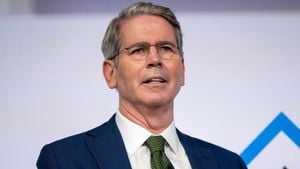With climate change at the forefront of global discussions, the COP29 conference is shaping up to be pivotal for international climate negotiations. Taking place from November 11 to 22, 2024, in Baku, Azerbaijan, the conference has attracted over 200 countries, including key players like Prime Minister Keir Starmer of the UK and Ukrainian President Volodymyr Zelensky. Conference attendees are grappling with the urgent need for effective climate action amid harsh climate realities.
On November 12, Prime Minister Starmer captured attention by announcing the UK’s ambitious target to cut its emissions by 81% by 2035, compared to 1990 levels. This new goal marks a significant increase from the previous interim target of 68%. Starmer emphasized the UK’s intent to re-establish itself as a leader in the fight against climate change, amid concerns over the consequences of former President Donald Trump’s potential return to the White House, which could threaten international commitments like the Paris Agreement.
The ambitious emissions reductions plan was well-received by climate advocates, who see this as the UK stepping forward as a climate frontrunner during a time when strong leadership is critically needed. Nick Mabey, co-chief executive of climate think tank E3G, praised the announcement, underscoring the importance of such leadership at COP29.
Despite this positive reception, experts argue the challenge is far greater than just emissions targets. Central to this year’s discussions is the issue of climate finance, especially as developing nations look to wealthier countries for support to adapt to the impacts of climate change. The current global food system is dominated by industrial agriculture, which is a significant contributor to carbon emissions, and campaigners are urging the UK to leverage its new commitments to support fair trade practices.
Alexander Carnwath, head of public affairs at the Fairtrade Foundation, highlighted the need to address the links between trade and climate justice. He pointed out the disparity between the funding allocated for climate adaptation versus the needs of smallholder farmers who produce over one-third of the world’s food. Currently, only about 4% of global climate finance is dedicated to food systems, which poses challenges for these important producers.
One of the highlights of COP29 was the focus on the New Collective Quantified Goal on Finance (NCQG), which is intended to replace the old $100 billion annual climate finance target. This goal aims to meet the estimated need of over one trillion dollars annually to effectively address the climate crisis and maintain the global temperature rise below 1.5 degrees Celsius. Campaigners insist the UK should play a leading role, pushing for more aggressive financing targets necessary for vulnerable nations.
Yet, as discussions continue at the conference, reports indicate deep divisions remain concerning funding specifics and obligations among nations. An early draft from the negotiation sessions revealed extensive disagreements with many issues still under contention. Dr. Arunabha Ghosh, chief executive of the Council on Energy, Environment and Water (CEEW), noted the need for significant consensus-building efforts as time is running short.
The stakes are high as the outcomes from COP29 could set the tone for climate negotiations moving forward, with many advocates calling for rich countries, including the UK, to make bold commitments necessary to deliver real change. Campaigners stress the importance of equity and justice, particularly for frontline communities most affected by climate impacts.
Reflecting on the broader picture, the dialogue at COP29 aims not only to tackle climate change but also to reshape trade policies and international relations concerning environmental sustainability. The UK's new targets signal progress, but the path remains fraught with challenges requiring concerted action from all nations involved. Campaigners like Zahra Hdidou from Action Aid UK argue for real leadership, urging the UK to significantly ramp up its climate finance pledges to genuinely support vulnerable communities globally.
With the clock ticking, negotiations at COP29 are poised to be intense, as the world watches the UK’s actions closely. The conference will either bolster the UK’s leadership role or expose frailties within the commitment to achieve meaningful climate action. Moving forward, the efficacy of international climate policy hinges on the UK's ability to navigate the complicated waters of finance, mitigation commitments, and global cooperation against the backdrop of rising climate threats.



